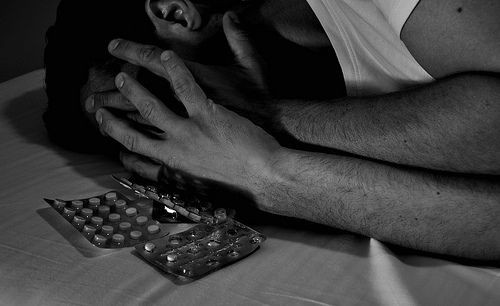Male Depression Goes Untreated: How Society’s Gender Roles Lead Both Sexes To Ignore The Warning Signs

As gender lines continue to blur in the United States, depression is also growing stock as a genuine neurological condition. Because of this, the relationship between gender and depression has become more difficult to reconcile. On the one hand, society is trying to move away from the notions that women are inherently emotional beings and that depression is merely a deep sadness. But on the other hand, research suggests people’s ability to notice cases of male depression is markedly worse than when women display the same symptoms. Solving one seems to rely on first solving the other.
Male depression has its own classification because depression is twice as common in women, and the symptoms associated with male depression tend to be unique to men. These include escapist behavior (greater time spent at work or on sports), substance abuse, controlling or abusive behavior, irritability, and risky and reckless behavior. Given recent research, however, increased depression rates in women may simply indicate undiagnosed cases in men.
This is evidenced by a recent study from the University of Westminster, which shows that a person’s ability to identify depressive symptoms is significantly worse when the depressed person is male. More than 1,200 participants read short, fictional stories about either Kate or Jack. Both stories were the same, save for the name change. When asked whether Kate or Jack seemed depressed, subjects were more likely to say Jack did not seem depressed. Those that did say he was depressed, in fact, were more often than not female.
Understanding Why Male Depression Goes Unseen
The Kate group read the following story:
For the past two weeks, Kate has been feeling really down. She wakes up in the morning with a flat, heavy feeling that sticks with her all day. She isn’t enjoying things the way she normally would. In fact, nothing gives her pleasure. Even when good things happen, they don’t seem to make Kate happy.
Fifty-seven percent of respondents thought Kate was suffering from a mental health problem, while 52 percent thought Jack was. And even though 10 percent were positive that Kate was not suffering from depression, 21 percent were positive Jack wasn’t.
Dr. James B. Potash, editor of the study, attributed the results to gender stereotypes about men. Not only are men supposed to externalize their feelings through anger and violence, Potash noted, but they are also expected not to acknowledge those feelings at all.
“A lot of attention has been paid to depression in women, and with good reason: depression is twice as common in women,” said Potash, who works as a professor of psychiatry at the University of Iowa. “There has been relatively little focus on education about depression in men. This [study] emphasizes the importance of figuring out how to get through to men that depression can be disabling and treatment is important.”
Potash’s second point highlights one of the study’s perhaps more alarming findings — that women are better identifiers of depressive symptoms in men. Study author Viren Swami noted that prevailing ideas of masculinity could contribute to the blindness of male depression.
“To the extent that mental illness is inconsistent with notions of hegemonic masculinity that stress toughness and strength,” Swami’s report states, “respondents may be less likely to view men with symptoms of depression as suffering from a mental health disorder and, consequently, may adopt less positive attitudes toward such persons.”
Because of this, men are left with “few resources with which to construct healthy attitudes toward mental health behaviors," according to Swami's report.
The Push For Mental Health Literacy
Here, the gender issues of male depression are made most lucid. People who are less likely to classify a man’s behavior as indicative of depression, according to Swami’s study, may be more likely to treat gender roles as distinct. These associations can then affect mental health literacy.
“While most previous studies have focused on mental health literacy (e.g., symptom recognition) as a means of promoting optimal help-seeking, the present work suggests that there may be some utility in focusing on broader individual differences,” the report states. “For example, intervention programs aimed at promoting more positive attitudes toward psychiatry and better scientific literacy may result in improved mental health literacy and, in turn, optimal help-seeking behaviors.”
He also highlights the importance of individual differences, which may go unnoticed, if not for a broader understanding of mental health. Such is a cause for greater education on the subject, he argues, rather than an appeal to stereotypes and tradition.
Of course, despite these goals, society very often sees men striving for self-reliance, holding the mindset that conquering depression is “something they ought to be able to do,” said Potash. “It’s the stereotype of men who never ask for directions. They won’t admit that they can’t take care of it themselves.”
Source: Swami V. Mental Health Literacy of Depression: Gender Differences and Attitudinal Antecedents in a Representative British Sample. PLoS ONE. 2012.



























